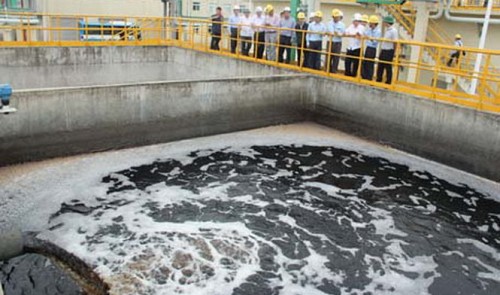Vietnam is setting the bar too low in terms of environmental protection for several industries with high pollution outputs like steelmaking, paper and pulp.
The Southeast Asian country has established policy guidelines universally applicable to all industries, which regulate how businesses should treat wastewater from their production.
However, there are also independent sets of environmental standards for each industry, where the regulations are much more relaxed.
Relaxed rules
In 2011, the Ministry of Environment and Natural Resources issued the national technical standard for industrial wastewater, with as many as 33 technical parameters.
However, just two years later, the same ministry issued the QCVN52/2013 guideline, a specific technical standard in terms of wastewater, emission and other outputs from the steelmaking industry, with the bar lowered for multiple parameters and several crucial criteria omitted.
“In guideline No.52, everything that needs to be overseen is not detailed,” a scientist from the Vietnam Academy of Science and Technology commented.
The expert explained that even within the steelmaking industry, no environmental standard was set for the allowable content of iron in wastewater.
According to the QCVN52/2013 guideline, a steelmaker is required to meet 12 parameters for its wastewater, far fewer than the 33 in the common national environmental standard set across all industries.
The restriction put on cyanide content, one of the most crucial parameters for wastewater, is also relaxed for steelmakers.
While the common guideline stipulates an allowable cyanide content of 0.1mg a liter, the No.52 guideline generously extends that limit by five times to 0.5mg a liter.
Indeed, the steel mill developed by Taiwan’s Formosa Plastics Group in the north-central province of Ha Tinh was able to produce wastewater with 0.585mg of cyanide per liter, nearly six times higher than the common standard.
The plant’s untreated wastewater led to April’s mass fish deaths throughout central Vietnam.
The emission standards stipulated in the QCVN52/2013 guideline do not include a carbon monoxide (CO) parameter, while offering a lenient standard on the toxic dioxin.
While the universal national standard sets a ceiling of 0.6 nanogram toxic equivalency (TEQ) per Normal cubic meters (Nm3) for dioxin resulting from the production of steel, the specific guideline for the steelmaking industry raises the bar to 1 nanogram TEQ per Nm3.
The environmental guidelines for other industries, such as seafood and papermaking, are also much more relaxed than the so-called universal set of standards.
In 2015, the Ministry of Environment and Natural Resources issued the guidelines on wastewater treatment for the seafood processing industry, with the allowable amount of ammonia in wastewater double that of the universal standard.
Similarly, papermaking companies currently need to meet seven technical parameters, compared to 33 in the common set of standards.
Standards to be updated
Dr. Tran The Loan, former head of the pollution control agency under the Ministry of Environment and Natural Resources’ General Department of Environment, said the environmental standards in Vietnam are prepared with little respect to the ‘resilience’ of the environment.
“Imagine an area with a number of plants, all discharging treated wastewater into one same river,” he said. “Even when each of the facilities meets the environmental standards, the river will soon fail to endure.”
Dr. Loan said this is evidenced by the fact that many rivers such as Thi Vai in the southern province of Ba Ria-Vung Tau or Cau in the south-central province of Phu Yen are becoming increasingly polluted as there are many factories nearby.
Hoang Duong Tung, deputy head of the General Department of Environment, said regulatory bodies are totally capable of imposing strict standards, but doing so “would discourage production.”
“[Too high environmental standards] are not suitable for the current development of our country,” he said.
Tung added that the law on standards and regulations allows two sets of guidelines, on both national and local levels, to co-exist.
“This means local administrations can set their own standards, which can be stricter than the national ones, for industries whose development is not encouraged,” he explained.
Tung added that under the current regulations, environmental standards should be reviewed and updated every three to five years.
“The environment ministry is speeding up the review task and is expected to finish by the end of next year,” he said.























































